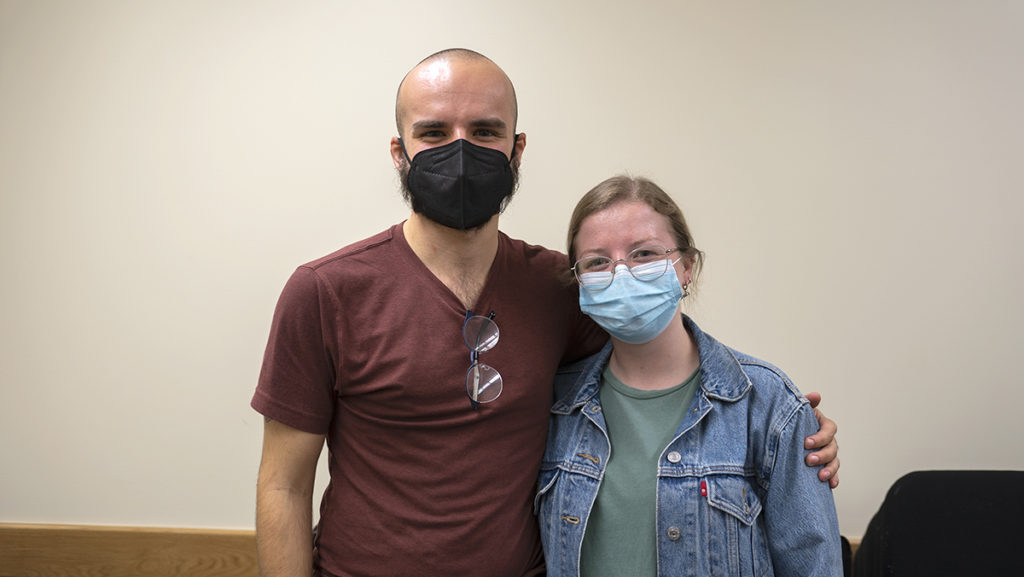Between standard academic responsibilities and personal life, students in the School of Music are required to follow a very strict schedule to ensure no practice time is wasted. Luckily, there is a place on campus that busy musicians can turn to in order to take a much needed moment for themselves.
Every other Thursday on the second floor of the James J. Whalen Center for Music, the Mental Health Awareness for Musicians Association (MHAMA) hosts a musician’s wellness circle in Whalen room 2328, where music students can meditate, draw, write and reflect in an effort to alleviate the stress that comes with being a musician. The event is hosted by MHAMA president senior Gavin Tremblay and treasurer senior Erin Smith, both of whom are musicians themselves.
Tremblay said that this year the association aims to play a more prominent role in the music school community by hosting a variety of events and continuing events that have been successful in the past.
The wellness circles were Tremblay’s idea, beginning the fall semester of last year via Zoom with “Wellness Wednesday.” Wellness Wednesday had low attendance, which Tremblay said he thinks was due to the fatigue students experienced being on Zoom all day.
“We focus on giving students a break from the academic side of their education,” Tremblay said. “We are very strictly a non-academic thing.”
The musician’s wellness circles also operate based on themes and topics chosen by MHAMA’s officers. On top of giving students a place to relax, MHAMA also invites guests to lead meditations, reflections and discussion at the end of some sessions.
The officers said there is a large number of music faculty and Center for Counseling and Psychiatric Services (CAPS) staff who offer valuable insight during their meetings. A huge part of MHAMA and the wellness circles is not only providing a space to heal musician’s mental health, but advocate for it.
The mental health of music students is a concern at colleges and universities across the country. Burnout in music students can occur for multiple reasons, like performance anxiety, perfectionism, heavier coursework, lack of sleep and excessive criticism. Raychl Smith and Adrienne Steiner, faculty members of the East Carolina University School of Music studied how students coped with these intense demands. They found that music majors report higher rates of anxiety and depression than the general undergraduate population, East Carolina News shared in an article.
Smith said she and Tremblay want to prove what they preach in regards to Whalen’s overwhelming course loads by assessing the academic lives of musicians with the Carnegie unit, a reference used for measuring the amount of time a student must study a subject.
“We’ve taken a certain schematic for a freshman, with 15 and a half credits and figured out all the credit hours that are required of you in a week,” Smith said. “We showed it to Ron Dow at CAPS and he was like, ‘You could sustain that for maybe a week, after that it’s damaging.’”
Ron Dow is a licenced clinical social worker and staff member at CAPS. Dow said the majority of student musicians, or any artists, do not experience severe mental illness, though he said the busy schedules and high-intensity situations involved with being a musician are not beneficial.
Music students usually take between 15-18 credits during a semester, but music courses like Aural Skills and Fundamentals of Music Theory — both which require extensive preparation and homework — are only one to two credits. So, the amount of courses that a music student takes at once can add up quickly.
Senior Zoe-Marie Fuentes is a student at the Whalen School. Fuentes says she is taking nine classes for a total of 17.5 credits, and highlights the stress that comes with this.
“I think that being a Whalen student is incredibly stressful, and there are so many factors that feed into this,” Fuentes said via email. “I can’t exactly compare one major or school to another … I think every area of study has their own types of stress and every individual handles them differently.”
Fuentes said a large contributor to the stress of being a student musician is the importance of being a performer to one’s identity. Grading a musician so harshly on something they use to represent themselves can lead to circumstances of poor mental health.
“One of the things that is super important to learn and realize as a music student is that it is okay to step back and take time for yourself,” Fuentes said. “Caring for yourself as a human is really important and goes hand in hand with your musicianship.”














